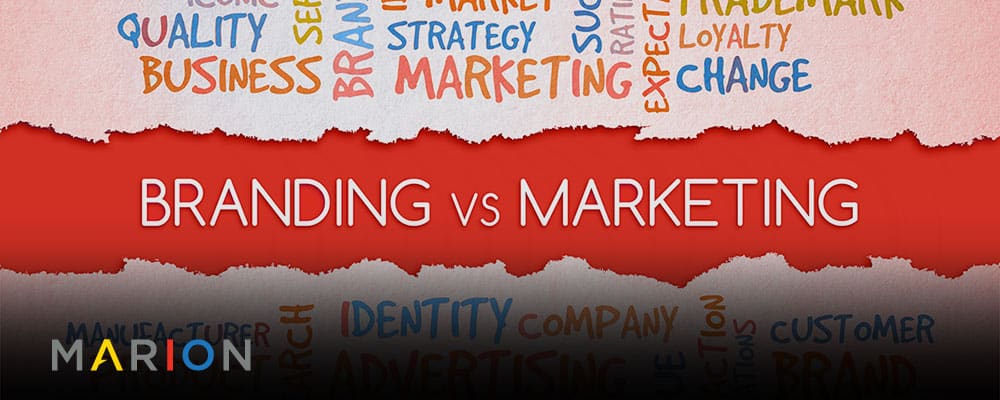It’s common to hear the terms “branding” and “marketing” thrown around when discussing the best way to grow a successful business. It’s easy to confuse the two, as they are often used as substitutes instead of separate concepts that should each be given careful consideration.
Learn about the differences in branding vs. marketing today to help you understand the unique benefits of each activity, and how to apply those benefits to your organization!
What Is Branding?
Branding is the distillation and communication of a company’s values, core principles, mission, style – basically whatever makes your company, product, or service unique. Your brand is generally communicated through graphics like logos, color schemes, fonts, and writing tone.
According to industry pro, Seth Godin, “A brand is the set of expectations, memories, stories, and relationships that, taken together, account for a consumer’s decision to choose one product or service over another.” Seth goes on to say that your brand only has value if it commands a premium, earns word of mouth, or is picked among a choice of other brands.
The process of developing a brand strategy has fluctuated very little over time. Many of the core components of a brand remain the same as they were 50 years ago, as the essence of a product or company evolves slower than its communication channels.
Common Branding Activities
In the bigger picture of branding and marketing strategy, your branding activities will typically include (but are not limited to):
- Brand Style Guide Creation
- Color Scheme Development
- Establishing a Tone and Voice for Communication
- Logo Design
- Mission and Vision Statements
- Core Values and Principles Development
- Reputation Management
- Unique Intangibles of Brand
Branding is rarely done in a vacuum, and the above items will need to be workshopped and refined based on target market research and user testing. Follow our guide on how to choose a branding agency for the best chance at finding a good firm for branding in Houston, Austin, or DFW.
What Is Marketing?
Marketing is the profitable connection of your product or service with paying customers. Marketing revolved around sales and promotion and cannot be successful unless your business offerings are reaching paying customers.
Depending on what your business provides, you can use either B2C or B2B marketing strategies to push your message out or pull your target customers into an interaction. Your marketing strategies and tactics should evolve as different trends in the time and attention expenditure of your target audience change.
For example, a television advertisement may have been the best way to reach the widest range of potential customers 30 years ago. However, as internet access became more widespread, social media turned into one of the largest marketplaces for customer time and attention.
Typical Marketing Activities
Most marketers will engage with one or several of the following strategies/tactics:
- Web Design and Development
- SEO
- Pay-per-Click & Digital Advertising
- Social Media Marketing
- Email Marketing
- Direct Mail Marketing
- Graphic Design
- Trade Show Marketing
- Traditional Media Placement
Digital marketing services have grown at an incredible rate in the past 20 years, largely because of the number of potential customers your brand can find on internet properties like publishing outlets, social media platforms, and search engines.
What Is the Difference Between Branding and Marketing?
Many people use branding and marketing almost interchangeably, but there are clear differences in branding vs. marketing. The following is an oversimplified attempt at explaining the difference between marketing and branding.
Branding is developing what should be communicated, and marketing is the act of communicating it.
Obviously, there is some overlap between marketing and branding. For example, graphic design is used to develop certain tangible elements of a brand like its colors and the feel of its logo. Graphic design is also used to market a brand via infographics, digital and physical collateral like sell sheets and product PDFs, and even within the design of a website.
Reputation management has also become very convoluted as digital marketing systems continue to integrate reputation signals into their platforms. For example, local SEO marketing takes reputation signals like reviews and direct brand searches into account while ranking search results.
The Psychological Difference
Psychologist Michael Levine highlights perhaps the most important difference between a branding and marketing strategy. “It is said that emotions drive 80 percent of the choices Americans make, while practicality and objectivity only represent about 20 percent of decision-making… People purchase or choose what they want, not what they need.”
At the end of the day, your marketing can try to use every statistic and rational angle under the sun to get someone to choose your brand over the next one. However, the way your brand makes a potential customer feel will be the deciding factor eight times out of ten.
In short, a strong brand can transform your product or service from a commodity into a market winner. This is exactly why you must invest plenty of time and energy into developing your brand before you begin marketing.
Brand Manager vs. Marketing Manager
A great technique for differentiating the different in a marketing manager vs. brand manager comes from Steve Johnson, CEO at Under10 Consulting. Steve recommends replacing “manager” with “expert” in both titles.
A marketing manager then becomes a marketing expert – someone who can organize strategies and tactics to communicate a brand and help get the sales process started. Fundamentally, a marketing manager should be able to make this happen for any number of brands, as the skillset is generally transferable (though that’s not always the case).
A brand manager could be thought of as a brand expert – someone who understands the ins and outs of a brand’s identity. It is this person’s job to undergo extensive user testing to determine what brand aspects best resonate with the target customer, and even readjust the brand’s understanding of the target customer if need be. The brand manager is essentially an agent of the brand, ready to evaluate and decide what is best for the brand at any given point.
Brand Marketing vs. Growth Marketing
Because of the tactical nature of marketing today, there is an obsession with growth marketing (AKA “performance marketing”). The beauty of the internet and voice-over IP (VOIP) phone systems is that you can track almost everything about a potential customer’s interaction with your business.
This is great for analytical marketers and provides a somewhat clear path for improvement since their success can be gained and indicated by the relevant stats. However, industry veterans have begun asking if the younger, technically-savvy crowd of performance marketers are actually good at marketing, or just good at the tactics associated with each platform.
You can almost completely ignore a brand identity and still achieve high share counts, high rankings, and high click-through rates that lead to increased sales. However, the short-sighted approach to marketing doesn’t continually invest in a brand that can stand strong when your potential customers make an emotional choice.
Brand marketing is a more holistic approach to branding and marketing. This type of marketing considers the visual and tonal aspects of your brand throughout all platforms and uses those components as an advantage. A strong brand can accelerate social media, SEO, and paid ad results, and brand marketers know it.
MARION Is the Branding and Marketing Company You’ve Been Looking for
MARION has been serving the marketing and branding needs of Texas businesses for nearly 40 years. Our Texas marketing agency has the skill set it takes to develop a powerful brand and successfully bring it to market in a profitable way.



